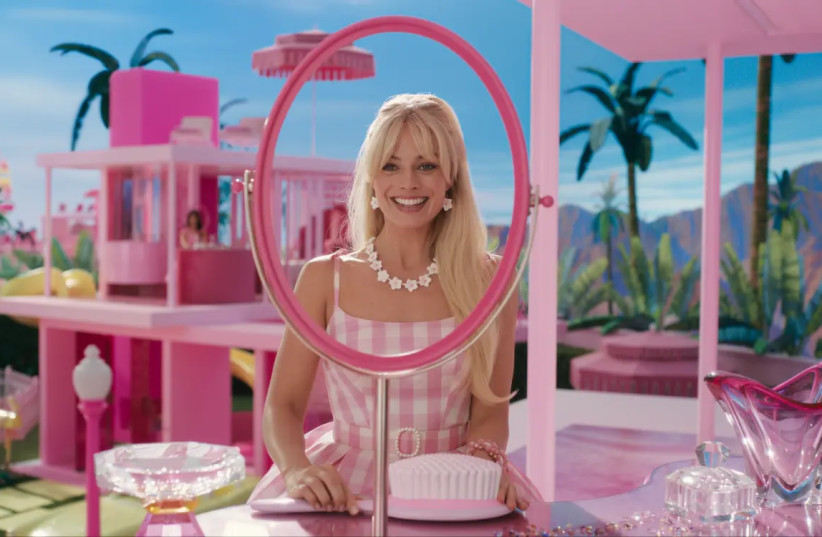The much-hyped Barbie movie, which opened here on July 20 and in most of the world the following day, is a sticky pink mess, mixing preachy and often contradictory messages with what is meant to be silly fun and eye candy.
But none of that seemed to matter to the throngs of pink-clad 20-something moviegoers who attended a preview screening at the Jerusalem Cinematheque Wednesday night.
They whooped and applauded even the credits – this was the movie that they had been waiting for, and no long-winded dialogue about patriarchy and capitalism was going to stop them from having a few moments of air-conditioned summer fun in a dark theater with their besties.
Barbie Land isn't all fun and games
The movie, which has a script from the uber-hip indie filmmaker partners Greta Gerwig (Little Women, Lady Bird) and Noah Baumbach (Marriage Story, White Noise), and which was directed by Gerwig, wants us to enjoy the absurdity of all things Barbie, but it also strives to provide a thought-provoking feminist critique. Gerwig and Baumbach are clever writers and some of the movie is genuinely funny, but whenever there are a few laughs, they switch back to some political or sociological sloganeering, as if we shouldn’t be allowed to have too much fun in Barbie Land.
The movie, which is narrated by Helen Mirren, starts out strong, with a parody of the opening of 2001: A Space Odyssey, as girls who are bored playing with baby dolls gather round a giant Barbie that appears among them.

Playing with an adult doll, the movie contends, helped girls think about possibilities beyond becoming mommies. We then shift to Barbie Land, where Barbies rule and Kens are second-class citizens and everything is just perfect. We get the message that Barbies have become diverse role models for girls, from all races and of all shapes and sizes – a true reflection of today’s Barbie-verse toy reality – including a Barbie president, played by Issa Rae, as well as a Barbie-staffed Supreme Court, Barbie doctors, Barbie athletes and, well, you get the idea. The Barbies believe that the girls who played with them have created a reality in the outside world where women rule.
Barbie learns that women are not always in charge
But one day, our heroine, Stereotypical Barbie (Margot Robbie), the tall, blonde original doll, starts thinking about death. Suddenly, she has flat feet and cellulite and is dispatched to Weird Barbie (Kate McKinnon), who tells her that she is having these thoughts because the girl who plays with her is feeling down. She must go to the real world to find this girl and help her.
So off she goes, with Ken (Ryan Gosling) tagging along, only to discover, to her dismay, that in present-day Los Angeles, women are not always in charge. Sasha (Ariana Greenblatt), the girl she thinks has been playing with her, savagely dresses her down, telling her, “You’ve been making women feel bad about themselves since you were invented.”
It turns out that her mother, Gloria (America Ferrara), a receptionist at the Mattel company, still believes in Barbie magic and has been playing with the Barbies that Sasha has outgrown.
Discovering the patriarchy in the real world
Meanwhile, in the corporate suite at Mattel, a group of male executives led by Will Ferrell are worried about the consequences of having dolls out and about in the real world.
Ken, however, is having the time of his life as he discovers “the patriarchy,” then returns to Barbie Land, ruining it with male domination, and the Kens indulge in beer-drinking, mansplaining, singing cringey emo tunes as they play guitar, and driving giant SUVs instead of the pastel sports cars the Barbies favor. Gloria and Sasha accompany a now-depressed Barbie back to Barbie Land to liberate it.
That’s basically the movie, but there is still time for a couple of more messages towards the end about self-acceptance and giving the Kens more agency and attention in the new, improved Barbie World.
Barbie teaches you a lesson
Don’t get me wrong, it’s not all preachy speeches, but there are far too many, although there are some funny jokes, especially about weird, discontinued Barbies, and Michael Cera plays Allen, Ken’s awkward buddy. Rhea Perlman shows up as Ruth Handler, the real-life woman who created Barbie, who acts as a kind of Jewish fairy godmother to Barbie, telling her, “You saved Barbie Land from the patriarchy,” and giving her permission to embrace her depression and cellulite.
I couldn’t help thinking about how Barbie has already been a big-screen character in Toy Story 2 and Toy Story 3, where the filmmakers used her more cleverly than anything that is done here.
But, to quote the Ruth Handler character, “Ideas live forever. Humans, not so much,” and the idea here is to sell tickets, merch, and Barbies while making audiences feel they are watching a subversive critique of capitalism and sexism, and from that point of view, the movie is a triumph.
